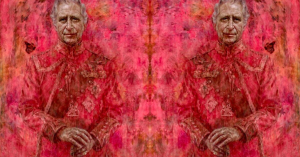Venezuela - Journalists Doubt Guaidó's Legitimacy - Regime Change Plans Continue

On February 23 the U.S. created a 'humanitarian aid' stunt at the border between Colombia and Venezuela. The stunt ended in a riot during which the supporters of the self declared 'president' Guaidó burned the trucks that where supposed to transport the 'aid'. Even the New York Times had to admit that.
The riots also marked the day that Guaidó lost the legal argument he had used to make himself 'interim president'.
Guaido also lost his original legal position. He claimed the presidency on January 23 under this paragraph of article 233 of the
Venezuelan constitution:
When an elected President becomes permanently unavailable to serve prior to his inauguration, a new election by universal suffrage and direct ballot shall be held within 30 consecutive days. Pending election and inauguration of the new President, the President of the National Assembly shall take charge of the Presidency of the Republic.
That the "elected President becomes permanently unavailable" was never the case to begin with. But if article 233 would apply Guaido would have had 30 days to hold new elections. The 30 days are over and Guaido did not even call for elections to be held. He thereby defied the exact same paragraph of the constitution that his (false) claim to the presidency is based on.
The hapless coup plotters in Washington DC were finally put on notice that the issue creates a legal problem for them. During a March 15 press briefing Elliott Abrams, the U.S. Special Representative for Venezuela, was asked about the issue:
QUESTION: [C]ould you explain to us the article under which Mr. Guaido declared himself president? It is said that it has expired last month. Could you explain that to us? What is the --
MR ABRAMS: As to the Venezuelan constitution, the National Assembly has passed a resolution that states that that 30-day period of interim presidency will not start ending or counting until the day Nicolas Maduro leaves power. So the 30 days doesn’t start now, it starts after Maduro. And they – that’s a resolution of the National Assembly.
A resolution of the National Assembly, which the Supreme Court of Venezuela holds in contempt over the seating illegally elected persons, can change the country's constitution? That does not sound convincing to me. The journalists in the briefing were equally curious of how the rules could be changed like that during the ongoing game:
Q: When did they – they did that after he --
A: They did that – this is roughly a month ago. We could try to find the date for you.
Q: When he was – when he was – took the mantle of interim president, that wasn’t there.
A: Yes, when – that’s correct. And so people --
Q: Can you do that ex post facto like that?
A: When people ask a question how do --
Q: That seems to be like saying I was elected for four years to be president, and then two years in you change the rules so that your term didn’t start – hasn’t even started yet. How does that happen?
A: Well, you don’t get a vote because you’re not in the National Assembly.
Q: Well, you don’t. You’re not in the National Assembly either.
Q: If it matters, does the U.S. view that as constitutional under their system?
A: Yes. I mean, we’re taking the – the National Assembly is the only legitimate democratic institution left in Venezuela, and their interpretation of the constitution, as you know, is that as of the date of this alleged term for Maduro, the presidency is vacant. But they have also said that that 30-day period starts when Maduro goes.
Q: So Juan Guaido is the interim president of an interim that doesn’t exist yet?
A: The 30-day end to his interim presidency starts counting. Because he’s not in power, that’s the problem. Maduro is still there. So they have decided that they will count that from when he actually is in power and Maduro’s gone. I think it’s logical.
Q: So then he really isn’t interim president, then?
A: He is interim president, but he’s not --
Q: With no power.
A: -- able to exercise the powers of the office because Maduro still is there.
Q: So their interpretation is that until and unless he actually has the power to run the country, he’s not actually the interim president?
A: No. Their interpretation is that the constitution requires a 30-day interim period, but it – those 30 days should not be counted while Maduro is still there exercising the powers of his former office.
Here is a video of the exchange. (Abrams seems to be lying about the alleged National Assembly resolution.)
The legal argument Abrams produced lacks logic and clearly contradicts the wording of the constitution quoted above.
- The elected president has not become unavailable. Maduro was sworn in for his second term on January 10. If the underlying argument is that Maduro was illegally elected to his second term, Guaidó should have declared himself 'interim president' on the day Maduro's first term ended, January 10, not some random 13 days later.
- The constitution says that an election shall be held within 30 days after the elected president becomes unavailable. If the argument is that Maduro was illegally elected to his second term, the 30 days started on January 10. If the National Assembly changed that "roughly a month ago" it must have been after the time had run out.
- In the constitution the election within 30 days is the precondition for the existence of the 'interim president', not the other way around: "Pending election and inauguration of the new President, the President of the National Assembly shall take charge ..."
With no election pending within 30 days there can be no 'interim president' - with power or without.
The legal subterfuge Abrams is using would not convince any serious court. It is of course well known that Abram's has little regard for the law. He was convicted for lying to Congress in two cases. But the issue will matter.
The U.S. seized Venezuelan assets, especially the Citgo refineries which are in financial trouble. The U.S. is trying to move all the valuable assets towards Guaidó to finance the next phased of its 'regime change' plan. Bondholders of Citgo will likely contest these impoundments and transfers of assets in court. There the argument Abrams made is not going to be a winning one.
The first round of the U.S. 'regime change' change attempt in Venezuela failed but it is far from over. The State Department alone foresees to spend $500 million more on it:
The Fiscal Year 2020 budget request includes funding to support democracy in Venezuela and provides the flexibility to make more funds available to support a democratic transition, including up to $500 million in transfer authority.
The CIA and the Pentagon will have made much larger budget requests even while an invasion of Venezuela continues to be unlikely.
In August last year so called Venezuelan army defectors attempted to kill Maduro with drones carrying explosives during a military ceremony. CNN talked with them. The men say they trained in Colombia and met at least three times with U.S. officials. It is likely that such assassination attempts, undoubtedly organized by the CIA, will continue.
In preparation of the 'humanitarian aid' stunt the U.S. had asked Brazil to use military force to bring in the 'aid' into Venezuela and to allow a U.S. presence at the border. The far-right President Jair Bolsonaro of Brazil supported that but the military of Brazil, which holds significant power in the cabinet, vetoed it (in Portuguese).
Bosonaro is currently in Washington to meet President Trump. He also made an unusual visit to the CIA headquarter likely to review plans for future operations in Venezuela:
A senior U.S. administration official briefing reporters on condition of anonymity, noted that Brazil has a close relationship with Venezuela’s military and may be able to serve as a go-between with the security forces that continue to support Maduro.
...
“We have to sort Venezuela out,” Bolsonaro said. “We cannot leave them the way they are. We have to free the nation of Venezuela.”
That a Brazilian President visits the CIA, the agency responsible for violent coups and brutal dictatorships in Latin American is disgusting. Many people in Brazil will dislike it. Supporting a CIA coup in a neighboring country is worse. It’s hard to sink any lower.
The government of Venezuela is preparing to resists the next phase of the U.S. regime change attempt. It will export more of its oil to Russia which continues to be willing to pay for it.
After the large electricity outage and other sabotage attempts the situation in Venezuela is back to normal. No one is starving even as prices are high.
President Maduro asked his cabinet to resign. The new government and its tasks will be re-configured to resist better to U.S. pressure and the upcoming additional sanctions.
This will be a long fight.



